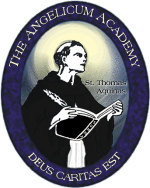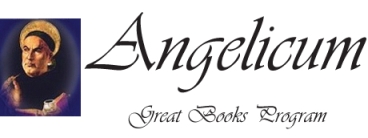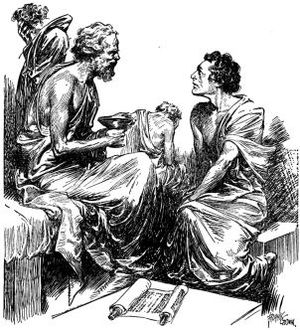2010-2011 School Year Class Times and Start Dates Posted for
Angelicum Great Books Program
CLICK HERE FOR NEW SCHOOL YEAR CLASS TIMES

K-12 Catholic Homeschool Program & Great Books Program
April 29, 2010
Angelicum Great Books Program Leave a comment
2010-2011 School Year Class Times and Start Dates Posted for
Angelicum Great Books Program
CLICK HERE FOR NEW SCHOOL YEAR CLASS TIMES

April 27, 2010
Angelicum Students, Homeschooling Leave a comment
 We are often asked if we have a curriculum book list. We hope the PDF below meets your needs. For any questions about our curriculum, please email us at AngelicumMailbox@aol.com.
We are often asked if we have a curriculum book list. We hope the PDF below meets your needs. For any questions about our curriculum, please email us at AngelicumMailbox@aol.com.
April 23, 2010
Angelicum Great Books Program, Newman Guide to Catholic Colleges 1 Comment

End the University as We Know It
By MARK C. TAYLOR
GRADUATE education is the Detroit of higher learning. Most graduate programs in American universities produce a product for which there is no market (candidates for teaching positions that do not exist) and develop skills for which there is20diminishing demand (research in subfields within subfields and publication in journals read by no one other than a few like-minded colleagues), all at a rapidly rising cost (sometimes well over $100,000 in student loans).
Widespread hiring freezes and layoffs have brought these problems into sharp relief now. But our graduate system has been in crisis for decades, and the seeds of this crisis go as far back as the formation of modern universities. Kant, in his 1798 work “The Conflict of the Faculties,” wrote that universities should “handle the entire content of learning by mass production, so to speak, by a division of labor, so that for every branch of the sciences there would be a public teacher or professor appointed as its trustee.”
Unfortunately this mass-production university model has led to separation where there ought to be collaboration and to ever-increasing specialization. In my own religion department, for example, we have 10 faculty members, working in eight subfields, with little overlap. And as departments fragment, research and publication become more and more about less and less. Each academic becomes the trustee not of a branch of the sciences, but of limited knowledge that all too often is irrelevant for genuinely important problems. A colleague recently boasted to me that his best student was doing his dissertation on how the medieval theologian Duns Scotus used citations.
The emphasis on narrow scholarship also encourages an educ ational system that has become a process of cloning. Faculty members cultivate those students whose futures they envision as identical to their own pasts, even though their tenures will stand in the way of these students having futures as full professors.
The dirty secret of higher education is that without underpaid graduate students to help in laboratories and with teaching, universities couldn’t conduct research or even instruct their growing undergraduate populations. That’s one of the main reasons we still encourage people to enroll in doctoral programs. It is simply cheaper to provide graduate students with modest stipends and adjuncts with as little as $5,000 a course — with no benefits — than it is to hire full-time professors.
In other words, young people enroll in graduate programs, work hard for subsistence pay and assume huge debt burdens, all because of the illusory promise of faculty appointments. But their economical presence, coupled with the intransigence of tenure, ensures that there will always be too many candidates for too few openings.
The other obstacle to change is that colleges and universities are self-regulating or, in academic parlance, governed by peer review. While trustees and administrations theoretically have some oversight responsibility, in practice, departments operate independently. To complicate matters further, once a faculty member has been granted tenure he is functionally autonomous. Many academics who cry out for the regulation of financial markets vehemently oppose it in their own departments.
If American higher education is to thrive in the 21st century, colleges and universities, like Wall Street and Detroit, must be rigorously regulated and completely restructured. The long process to make higher learning more agile, adaptive and imaginative can begin with six major steps:
1. Restructure the curriculum, beginning with graduate programs and proceeding as quickly as possible to undergraduate programs. The division-of-labor model of separate departments is obsolete and must be replaced with a curriculum structured like a web or complex adaptive network. Responsible teaching and scholarship must become cross-disciplinary and cross-cultural.
Just a few weeks ago, I attended a meeting of political scientists who had gathered to discuss why international relations theory had never considered the role of religion in society. Given the state of the world today, this is a significant oversight. There can be no adequate understanding of the most important issues we face when disciplines are cloistered from one another and operate on their own premises.
It would be far more effective to bring together people working on questions of religion, politics, history, economics, anthropology, sociology, literature, art, religion and philosophy to engage in comparative analysis of common problems. As the curriculum is restructured, fields of inquiry and methods of investigation will be transformed.
2. Abolish permanent departments, even for undergraduate education, and create problem-focused programs. These constantly evolving programs would have sunset clauses, and every seven years each one should be evaluated and either abolished, continued or significantly changed. It is possible to imagine a broad range of topics around which such zones of inquiry could be organized: Mind, Body, Law, Information, Networks, Language, Space, Time, Media, Money, Life and Water.
Consider, for example, a Water program. In the coming decades, water will become a more pressing problem than oil, and the quantity, quality and distribution of water will pose significant scientific, technological and ecological difficulties as well as serious political and economic challenges. These vexing practical problems cannot be adequately addressed without also considering important philosophical, religious and ethical issues. After all, beliefs shape practices as much as practices shape beliefs.
A Water program would bring together people in the humanities, arts, social and natural sciences with representatives from professional schools like medicine, law, business, engineering, social work, theology and architecture. Through the intersection of multiple perspectives and approaches, new theoretical insights will develop and unexpected practical solutions will emerge.
3. Increase collaboration among institutions. All institutions do not need to do all things and technology makes it possible for schools to form partnerships to share students and faculty. Institut ions will be able to expand while contracting. Let one college have a strong department in French, for example, and the other a strong department in German; through teleconferencing and the Internet both subjects can be taught at both places with half the staff. With these tools, I have already team-taught semester-long seminars in real time at the Universities of Helsinki and Melbourne.
4. Transform the traditional dissertation. In the arts and humanities, where looming cutbacks will be most devastating, there is no longer a market for books modeled on the medieval dissertation, with more footnotes than text. As financial pressures on university presses continue to mount, publication of dissertations, and with it scholarly certification, is almost impossible. (The average university press print run of a dissertation that has been converted into a book is less than 500, and sales are usually considerably lower.) For many years, I have taught undergraduate courses in which students do not write traditional papers but develop analytic treatments in formats from hypertext and Web sites to films and video games. Graduate students should likewise be encouraged to produce “theses” in alternative formats.
5. Expand the range of professional options for graduate students. Most graduate students will never hold the kind of job for which they are being trained. It is, therefore, necessary to help them prepare for work in fields other than higher education. The exposure to new approaches and different20cultures and the consideration of real-life issues will prepare students for jobs at businesses and nonprofit organizations. Moreover, the knowledge and skills they will cultivate in the new universities will enable them to adapt to a constantly changing world.
6. Impose mandatory retirement and abolish tenure. Initially intended to protect academic freedom, tenure has resulted in institutions with little turnover and professors impervious to change. After all, once tenure has been granted, there is no leverage to encourage a professor to continue to develop professionally or to require him or her to assume responsibilities like administration and student advising. Tenure should be replaced with seven-year contracts, which, like the programs in which faculty teach, can be terminated or renewed. This policy would enable colleges and universities to reward researchers, scholars and teachers who continue to evolve and remain productive while also making room for young people with new ideas and skills.
For many years, I have told students, “Do not do what I do; rather, take whatever I have to offer and do with it what I could never imagine doing and then come back and tell me about it.” My hope is that colleges and universities will be shaken out of their complacency and will open academia to a future we cannot conceive.
Mark C. Taylor, the chairman of the religion department at Columbia, is the author of the forthcoming “Field20Notes From Elsewhere: Reflections on Dying and Living.”
April 16, 2010
Angelicum Great Books Program, Great Books of the Western World, Students of our Great Books Program Leave a comment

April 12, 2010
Angelicum Students, Great Books Essays by Our Students 1 Comment

Socrates is considered one of the greatest thinkers of all time. This was not because he was the most intelligent, but as he states in the Apology, it was because he knew he didn’t know everything. He enjoyed questioning people and getting them to think deeper and he would consider other’s opinions. He refers to himself as a gadfly that pesters the horse into action. This is the case in Plato’s Meno. Socrates is having a discussion with Meno on whether virtues are teachable. This conversation leads to what does it take for a man to be a success. Socrates states that there are two ways in which men succeed. They are though true knowledge and right opinion. Although there are differences between them, they both will lead to success.
 Socrates refers to True Knowledge as one of the ways in which men succeed. He makes the argument that things are only beneficial when done with wisdom and knowledge because this will bring about good and happiness which then leads to success. True Knowledge is those things we know to be correct because of our own learning experiences. Everything that a person endures if directed by true knowledge can only lead to the right decision therefore to true success. Humans are flawed and make mistakes, however, if they learn from them they will make better decisions in the future. It is shown all through history that those who have learned from their mistakes ultimately succeed. For example, King David in his excitement to get the Ark of Covenant back to Jerusalem did not follow the way in which God had commanded. The driver of the cart was killed accidentally. David realized that he had not followed the Law of God. He then repented and brought the Ark of Covenant back to Jerusalem in the way which God had intended. David learned from his experience and made the right decision the second time which led to the success of the Ark returning to its rightful place. During the battle of Thermopylae when the Persians fought the Greeks, they underestimated the strength of the Spartans this lead to heavy casualties for the Persians. In the battles that followed the Persians anticipated the power of the Spartans and they were able to match them with equal strength and win the battles. This theory pertains to all aspects of life and all people. If a person uses what they know to be true to make decisions their lives will be better. Even in the basics this works. For example, going out in the snow with no shoes or touching a hot stove. Once you have experienced it you know not to do it again. Socrates was correct in stating that if True Knowledge, that is learning experiences and wisdom, is used a person will have success.
Socrates refers to True Knowledge as one of the ways in which men succeed. He makes the argument that things are only beneficial when done with wisdom and knowledge because this will bring about good and happiness which then leads to success. True Knowledge is those things we know to be correct because of our own learning experiences. Everything that a person endures if directed by true knowledge can only lead to the right decision therefore to true success. Humans are flawed and make mistakes, however, if they learn from them they will make better decisions in the future. It is shown all through history that those who have learned from their mistakes ultimately succeed. For example, King David in his excitement to get the Ark of Covenant back to Jerusalem did not follow the way in which God had commanded. The driver of the cart was killed accidentally. David realized that he had not followed the Law of God. He then repented and brought the Ark of Covenant back to Jerusalem in the way which God had intended. David learned from his experience and made the right decision the second time which led to the success of the Ark returning to its rightful place. During the battle of Thermopylae when the Persians fought the Greeks, they underestimated the strength of the Spartans this lead to heavy casualties for the Persians. In the battles that followed the Persians anticipated the power of the Spartans and they were able to match them with equal strength and win the battles. This theory pertains to all aspects of life and all people. If a person uses what they know to be true to make decisions their lives will be better. Even in the basics this works. For example, going out in the snow with no shoes or touching a hot stove. Once you have experienced it you know not to do it again. Socrates was correct in stating that if True Knowledge, that is learning experiences and wisdom, is used a person will have success.

The other way in which Socrates said that man can succeed is through right opinion. Right opinion is making decisions based on what a person has heard, read, or has been told then draws a conclusion with that information. If the information is correct it will lead to right opinion and then to success. For instance, the early Christians who followed the Apostles did so based on what they were told. Most had never meant Jesus, but made the decision to become His followers. Even through hardships people were happier because they believed they would be saved. This brought them success in their beliefs and their lives. Leaders often make military decisions based on right opinion. Information they gather from reading or from being told by other leaders or local townspeople. Such was the case with King Xertes. He made a decision to go on a mountain pass with part of his army in order to surround the Greek forces. He made this decision based on the word of a merchant from Greece. He was not familiar with the area and he had no knowledge of it, but needed to make a good decision. The merchant told him about the mountain pass. Feeling it was right to trust the merchant he made a decision based on opinion. This brought success by allowing the Persians to enter Greece. Through right opinion a person takes all information they have and make a right decision to order to bring about success.
 True knowledge and right opinion will both bring success to a person’s life. Socrates believes that success is doing what is beneficial for the soul. True knowledge is making life choices based on a person’s own experience. They know through their previous choices what will bring success. Right opinion is not having experienced it yourself, but taking information from other people and using their experiences to make your decisions. This results in new experiences and memories for you thus becoming true knowledge. If both are taken into consideration, a person will choose what is most beneficial to their success and happiness.
True knowledge and right opinion will both bring success to a person’s life. Socrates believes that success is doing what is beneficial for the soul. True knowledge is making life choices based on a person’s own experience. They know through their previous choices what will bring success. Right opinion is not having experienced it yourself, but taking information from other people and using their experiences to make your decisions. This results in new experiences and memories for you thus becoming true knowledge. If both are taken into consideration, a person will choose what is most beneficial to their success and happiness.